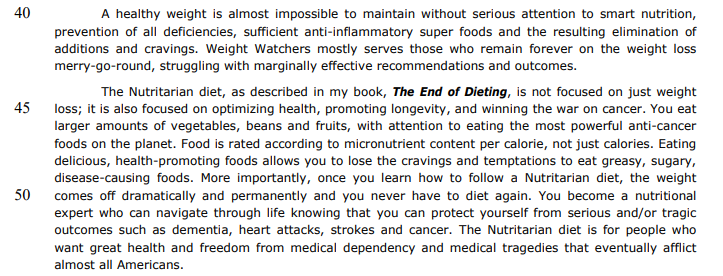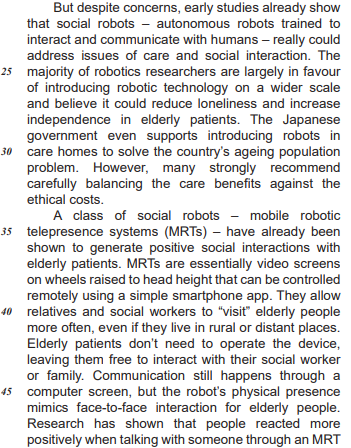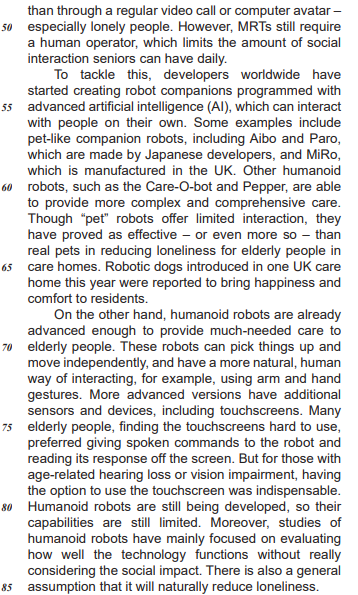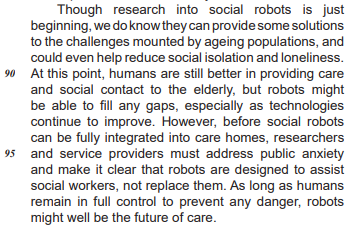O par correto de sinônimos está na alternativa

THE HONEYBEE has... Disponível em: <www.bbc.co.uk/news/scienceenvironment-34749846>. Acesso em: 21 set. 2016.

THE HONEYBEE has... Disponível em: <www.bbc.co.uk/news/scienceenvironment-34749846>. Acesso em: 21 set. 2016.


Adapted from https://www.bbc.com/news/world-47722427





Leia o infográfico para responder à questão.

(www.medicalnewstoday.com. Adaptado.)
Leia o texto para responder à questão.
Do fat people stay warmer than thin people?
Pack on some extra pounds for winter
By Daniel Engber
01.02.2014
At the yearly Rottnest Channel Swim in Western Australia, participants often smear their bodies with animal fat for insulation against the 70-degree water. But their own body fat also helps to keep them warm, like an extra layer of clothing beneath the skin. When scientists studied aspects of the event in 2006, they found that swimmers with a greater body mass index (BMI) appear to be at much lower risk of getting hypothermia.
The same effect has been demonstrated in hospitals where patients who’ve suffered cardiac arrest are treated with “therapeutic hypothermia” to stave off brain injury and inflammation. Studies have shown that it takes longer to induce hypothermia in obese patients than in their leaner counterparts. The extra fat seems to insulate the body’s core.
Under certain conditions, though, overweight people might feel colder than people of average weight. That’s because the brain combines two signals — the temperature inside the body and the temperature on the surface of the skin — to determine when it’s time to constrict blood vessels (which limits heat loss through the skin) and trigger shivering (which generates heat). And since subcutaneous fat traps heat, an obese person’s core will tend to remain warm while his or her skin cools down. According to Catherine O’Brien, a research physiologist with the U.S. Army Research Institute of Environmental Medicine, it’s possible that the lower skin temperature would give fatter people the sense of being colder overall.
But O’Brien points out that many other factors beyond subcutaneous fat help determine the rate at which we chill. Smaller people, who have more surface area compared to the total volume of their bodies, lose heat more quickly. (It’s often said that women feel colder than men; average body size may play a part.) A more muscular physique may also offer some protection against hypothermia, partly because muscle tissue generates lots of heat. “We have a joke around here that the person who’s best-suited for cold is fit and fat,” says O’Brien.
(www.popsci.com)


Available at:
In “to look for keywords, and to read in a less linear, more selective fashion, instead of concentrating more on just following the text.” (lines 41-43) and “She has decided that, despite all her training in deep reading, she, too, needs some outside help.” (lines 51-53), the connectors instead of and despite can be replaced, without any change in form and meaning, respectively, by
INSTRUÇÃO: Responder à questão com base no texto.


Adapted from: https://www.newyorker.com/science/maria-konnikova/being-a-better-online-reader



By Dr. Joel Fuhrman
Retrieved and adapted from https://www.drfuhrman.com/learn/library/articles/46/weight-watchers-focuses-onweight-not-health
Access on April 26, 2017.



By Dr. Joel Fuhrman
Retrieved and adapted from https://www.drfuhrman.com/learn/library/articles/46/weight-watchers-focuses-onweight-not-health
Access on April 26, 2017.
The true potential of technology to change behavior
Technology could successfully change behaviours where decades of campaigns and legislation have failed. With the quantified self already walking among us and the internet of things within easy reach, digital technology is creating unprecedented opportunities to encourage, enable and empower more sustainable behaviours.
If we are to unlock the power of technology we must be more ambitious than simply digitising analogue strategies or creating another communications channel.
The true potential of technology lies in its ability to do things that nothing else can do. In behaviour change terms, the potential to succeed where decades of education programmes, awareness campaigns and product innovation have failed; to make a difference where government policy and legislation has had limited impact.
Using behavioural insights, it is possible to highlight the bottlenecks, drop out points and achilles heels of traditional behaviour change efforts — the reasons why we have failed in the past — and apply the unique possibilities of technology to these specific challenges.
Overcoming our limitations
Luckily, the history of the human race is almost defined by its ability to invent stuff that bolsters its feeble capabilities. That stuff is, of course, what we generically refer to as 'technology'. And in the same way that the internal combustion engine and the light bulb allow us to overcome our relatively feeble powers of motion and perception, so digital technology can be directed to overcoming our relatively feeble powers of reasoning, selfcontrol, motivation, self-awareness and agency—the factors that make behaviour change so difficult.
Herein lies the true potential of technology: not in the laboratory or the workshop, but in an understanding of the behavioural dynamics that define the human condition, both generally and within the context of a specific user-group, market segment or community.
Fonte: JOHNSON, Steven. Recognising the true potential of technology to change behaviour. Disponível em:<https://www.theguardian.com/sustainablebusiness/behavioural-insights/true-potential-technology-change-behaviour>
Texto
TRUMP-KIM SUMMIT: DONALD TRUMP VOWS TO 'END WAR GAMES' IN 'NEW HISTORY' WITH NORTH KOREA
By Ben Riley-Smith, US editor, in Singapore 13 JUNE 2018 • 8:10AM – The Telegraph

Donald Trump unexpectedly suspended "war games" on the Korean peninsula yesterday as he convinced Kim Jong-un to back "complete denuclearisation" in a written agreement. The US has been carrying out joint military exercises for years in the region as a signal of its military alliance with Seoul (South Korea), and as a show of strength against North Korean aggression.
The US president said in a press conference after the Singapore summit: "It is a very great day, it is a very great moment, in the history of the world." He predicted Kim would start denuclearise "very quickly" and revealed that the North Korean leader had already agreed to destroy a missile engine testing site.
The climax of Mr Trump‘s meeting with Kim — the first between a sitting North Korean and American leader — was the signing of a joint agreement. The 400-word statement followed more than four hours of talks, first between the leaders one-on-one and then with a wider group of advisers.
It read: "President Trump and Chairman Kim Jong-un conducted a comprehensive, in-depth, and sincere exchange of opinions on the issues related to the establishment of new United States - North Korea relations and the building of a lasting and robust peace regime on the Korean Peninsula.
The statement went on to list four specific pledges that both Mr Trump and Kim agreed to stand by: The first was that both countries would establish "new relations" in the pursuit of "peace and prosperity" — an attempt to draw a line under the insults and threats of last year. The second said that America and North Korea would "join their efforts to build a lasting and stable peace regime on the Korean Peninsula". The third said that Kim‘s regime "commits to work toward complete denuclearisation of the Korean Peninsula" — a key demand from the Americans. And the fourth promised that the remains of fallen US soldiers who died fighting in the Korean War would be repatriated to the United States.
Mr Trump said he "absolutely" would invite Kim to the White House and expressed enthusiasm for visiting North Korea, but said no dates had been set. Mr Trump also praised the leaders of Japan, South Korea and China as well as Kim himself for the progress made on the issue of denuclearisation.
Source: < https://goo.gl/dEim38> Date of retrieval: June 13th, 2018.




Available at:<https://www.independent.co.uk/life-style/gadgetsand-tech/features/robot-carer-elderly-people-lonelinessageing-population-care-homes-a8659801.html>. Retrieved on:
July 2, 2019. Adapted.